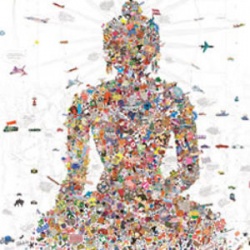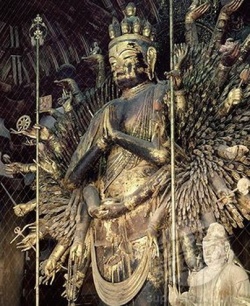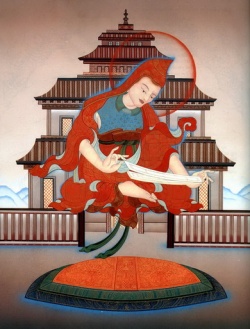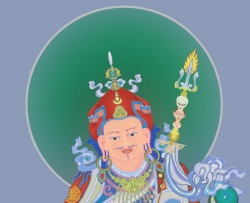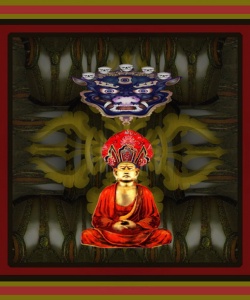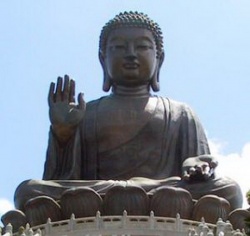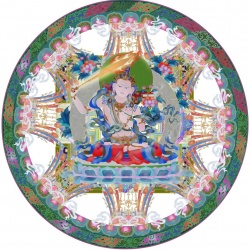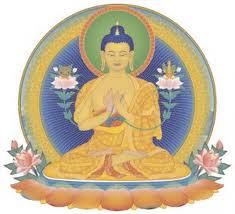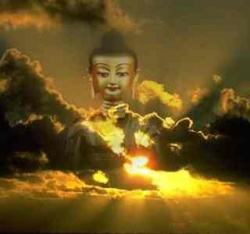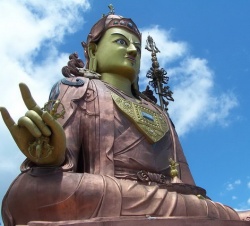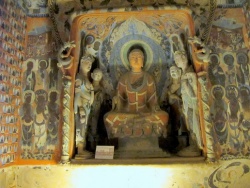Dialogue on buddhism among friends compiled by Yn Yiu
In recent months a group of friends exchanged views on Buddhism in a private forum online. It is thought that some of the contents may be of interest to people outside the group. They are extracted and arranged by subject for sharing. Views and suggestions are welcome. Ed.
Is Buddhism a Religion?
YK: I just had a lengthy discussion with YN on the phone. He talked about his knowledge on Buddhism and admits that he is more a believer in the philosophy than a believer in the absolute religion. He said Buddha is a man not a god.
According to YN, when Buddhism was first introduced to China in the first century AD it had to fit in to the indigenous culture so that it could take root and flourish. In the course time it integrated the popular philosophical ideas of Confucianism , Taoism and other schools of Chinese philosophy and evolved to become Chinese Buddhism. But for my scanty knowledge, there is no description of a certain god being the creator of the universe. Taoism or Lao Tze only claims nature as the primary motion force. The universe came from nothingness. From nature, Tao begets one, one begets two, two begets three and three begets all myriad things. We can see that Tao is not really a religion.
It merely asserts what nature had done, not by the hands of god. In the Taoist world, nature is indifferent and amoral. Nature won’t change by our praying to god. Nature does not approve good deeds nor punish bad guys. It is a philosophy strictly. People observing Taoist rituals do not necessarily understand taoist philosophy. Confucianism is, in a nutshell, a practical philosophy. It deals with not the spiritual aspect of the people but with the relations between people, between members in a family and between citizens and the state to create social harmony. Its guiding principle for human behaviour is “Do not do to others what you do not want others do to you”( 己所不欲, 勿施於人.)
KAM: Unlike the followers of other faiths, it is completely acceptable for a Buddhist in China to worship his/her ancestors, worship heaven and follow the religious rites of Chinese festivals. There is normally no objection to a Buddhist marrying a Taoist. And speaking of religions in China, Chinese I think believe that people who have done good deeds can become saints and are worshipped as such. People like Kwan Wan Cheung, Bao Ching, Kung Ming and Yue Fei are worshipped like gods and temples have been built for them. They are believed to have supernatural powers and many people pray for their blessings.
We even worship stones and trees.
What I don't understand is why Confucianism has been turned into a religion. Of course a lot depends on what we mean by religion but if I understand religion to mean a body of knowledge relating to God or gods or other supernatural or spiritual beings, then I do not see why Confucianism is a religion. On the other hand, following the traditional belief, Confucius is worshipped as a saint now.
Taoism is I think quite different. On the basis the Daodejing, many supernatural theories and practices have been developed and I am not surprised it is now a respected religion in China.
I have not studied religion but the above is just what I understand from my general reading about religion.
YN: In my limited understanding, I don’t think Confucian scholars throughout history formally called Confucianism a religion. He is respected as a great teacher. Later on, as with other great men, Chinese people began to erect temples to worship him and treated him as deity. So I wouldn’t call Confucianism a religion in the strict sense of the term though many Chinese and foreigners have referred to it as one of the three main religions in China –Confucianism, Buddhism and Taoism (currently spelled Daoism).
In the early stage, Buddhism was not a religion either. Buddha resisted the pressure to make him a god. He said “You must not blindly believe in what I said but put my teachings to strict tests before believing.” When Buddha was dying, his disciples asked him what they should follow after his death. He replied, ” follow the dharma not the person.” (依法不依人)
In China, a very accomplished Buddhist scholar Ouyang Jingwu (歐陽竟無 1871- 1944) gave in the early days of the Chinese Republic a well-known speech entitled Buddha’s teachings are not religion(佛法非宗教). “If religion means adhering to a dogma that you’re supposed to accept by an act of blind faith, without it being necessary to rediscover the truth of that dogma by yourself, then Buddhism isn’t a religion. Buddhism is a metaphysical tradition, from which wisdom applicable in every instant and in all circumstances is derived.”(Matthieu Richard)
One can benefit from studying and practicing Buddha’s teachings without believing in the supernatural elements most of which were, I believe, introduced into Buddhism in later years when Buddhism spread far and wide. One doesn’t have to be a formal Buddhist to participate in many Buddhist activities, such as lectures, meetings, meditation etc. If Kam wishes to go deeper into Buddhism in a scientific and philosophical way I would recommend THE MONK AND THE PHILOSOPHER BY MATHIEU RICARD. I read it more than once. It has been a bestseller and translated into many languages.
YN: Kam, if you are bored by the supernatural parts in Buddhist literature, you can either skip them and continue on the philosophical contents, or you can choose other materials that only contain philosophical Buddhism. A simple leaflet written by a Western scholar might suit you. Or you can search "Religion in China" in Wikipedia. It should give you sufficient information to whet your appetite on the subject.
ANTHONY: The question whether Buddhism is a philosophy or a religion is a very difficult to answer. The simple answer is that it is a philosophy and a religion but it is also neither philosophy nor a religion.
The first answer is that Buddhism has already been accepted as one of the academic disciplines in many faculties of philosophy among university all over the world. According to one of the definitions of philosophy, it is described as ' the study of general and fundamental problems concerning matters such as existence, knowledge, truth, beauty, justice, validity...' which Buddhism also covers. It is a religion because it is often seen in par with Christianity, Islamism, Hinduism...etc. and that it is also included in the discipline of religious studies in high schools and in universities. However it also has all the forms and rituals as other religions.
It is not a philosophy because the discipline of philosophy consists of some of the major studies including logic, metaphysics, epistemology, ethics and aesthetics.... each of which is a separate subject for study. Buddhism not only embraces both the study of 'general and fundamental problems ' and also covers the above subject-contents including the study of the universe and human nature. If one studies Buddhism, one would appreciate the teachings of Buddha is over and above all the academic studies because all the contents are inter-mingled as a complete whole but at the same time could be separately defined and studied.
However, the most important thing which Buddhism differs from philosophy because it emphasizes practice and proof. To study Buddhism, one needs to believe 信(Xin) , to understand 解(Jie), to practise 行(Xing) and to prove证 (Zheng). This means that one has to believe in the teachings of Budddha, to be able to fully comprehend the actual meaning and ideas of all the teachings, to practise and to apply according to Buddha’s teachings in daily life, and to prove and testify in the course of practice.
It is not a religion because Buddha does not encourage his followers to record his teachings to do worshipping because his words and teachings are specific for different individuals. It is only after he died that his followers formed into different sects and started building temples to worship him. In fact, Confucius and Lao Tze would never thought that they have become the founding heads of Confucianism and Daoism. They are being exploited by the people after their death for various purposes. One of the Buddha's remarks is that 'To study Buddhism for one year, Buddha is in front of you. To study Buddhism for two years, Buddha is in the horizon. To study Buddhism for three years, Buddha is used to make money".
HANI: I totally respect Buddhism teachings and its philosophy. However, it is very difficult to believe what was quoted by YN the Buddhist belief ' that if a person who is clinically dead is not completely dead as the stream of consciousness has not left the body within 12 hours . Any crying or wailing will disturb the dead person's peace. '. If I take Buddhism as a religion, I believe it unconditionally, but if I believe Buddhism as a form of philosophy, I wonder how a living person would know that the dead person still has the stream of consciousness within 12 hours after a person is clinically dead.
YN: Unlike some other main religions, Buddhism does not force any person to accept its belief and doctrines without question. Buddha himself always asked people not to believe what he had said without testing it out themselves. Buddhism is called the science of the mind by a scientist monk.
People who are interested in Buddhism can study it with an open mind and ultimately have to experience it themselves. It can be treated as philosophy, psychology, or metaphysics. In whatever way it is studied the result will be beneficial to life the main objective of which is happiness.
I don’t rule out any possibilities in human life which in many areas is a mystery and for thousands of years many highly intelligent people have devoted their whole lives trying to uncover or experience the mystery of life. They were successful to a certain extent and Buddha was the most successful one.
I would like recommend to Hani THE QUANTUM AND THE LOTUS by Matthieu Ricard & Trinh Xuan Thuan. It is a dialogue between a biologist monk and a Buddhist astrophysicist on Buddhism. It is hailed as A JOURNEY TO THE FRONTIERS WHERE SCIENCE AND BUDDHISM MEET
The question of the soul
YK. When people say all crows in this world are black. All you need to disprove it is to find one which is not. If you find one white crow you should know that you are on the right track. If people say all souls die after death, then you need only one case to disprove it.
LETMEHEAL: Souls do not die after death, they are permanent and cannot die, but are directed to where they belong, depending on the good or bad deeds their hosts have done on earth. Only the physical body dies.
YN: Buddhism does not believe that there is a soul which Hinduism believes. Here soul is defined as an entity in a certain form. Buddhism believes, instead, that the stream of consciousness leaves the body after death. It carries with it the person's karma ( 業 )which is the "balance sheet" of one's past deeds. Here is a Buddhist saying: There is nothing that is passed on after death except karma. (一切帶不去,只有業相隨)。
YK: Can I ask YN what is " a stream of consciousness that leaves a body carrying its karma"? Is this not the same as "soul"
YN: In reply toYK’s question it should be explained that Buddha's teaching that the human self has no soul (anatta) is given in contrast to the Hindu belief of a soul (atman) which is a ghostly wraith within the body that animates the body and outlasts it. (HUSTION SMITH ) The term "stream of consciousness" is used by Matthieu Ricard to mean "information". Richard uses the analogy of the passing of knowledge from one to another to explain the meaning of transmigration (輪 回). In this process there is no transfer of physical substance. The Buddha uses the analogy of the flame of a candle lighting another candle to explain the same. After the second candle is lit the first candle still remains but the flame passes on. Another example is: When a teacher impart his knowledge to a student there is no transfer of anything in physical form or visible.
The meaning of “emptiness”
KAM: There appears to be a contradiction between the concept of 'ye' (karma) and the teachings of Buddhism. If we believe that everything is in a state of emptiness and nothingness, including ourselves and that we also live in a state of nothingness, there cannot be any 'ye'. Therefore I don't believe in judgment after death because there will not be anything on which to judge.
YN: The Buddhist term "emptiness" is often misunderstood. The original term in Sanskrit is "sunyata". Emptiness " or sunyata in Sanskrit is a characteristic of phenomena arising from the fact (as observed and taught by the Buddha) that the impermanent nature of form means that nothing possesses essential, enduring identity." (See Wikipedia under "Sunyata"). In short it means all phenomena are impermanent because they change continuously. I think one of the most important teachings of Buddha is about change or impermannence. Emptiness does not mean nothingness.
The basic teaching of the Heart Sutra (心經) is about “emptiness” and its essence is express thus: "Form is emptiness; emptiness is form." (色即是空;空 即是色). A simple interpretation is that form and emptiness are one.
KAM: May I request YN or other members of the forum to enlighten me on the Buddhist teaching that things are ever changing or evolving. Are changes caused by some external factors or are they a natural process? I have been thinking how this particular Buddhist teaching can be applied to our daily life.
YN: To take a simple view, life is a very good example of change. Birth, aging, sickness, death, 生老病死 is a process – from birth to death. A process is ever changing. When we accept that death is the natural end of life we will face it with the expectation that we should die without regret. Buddhism is a religion about life and death – how to live how to die.
Everything is impermanent. It is changing forever. Buddhism describes the process as forming, staying, deteriorating, emptying (成住壞空). Everything is changing’; there is nothing we can hold onto as permanent. One cannot touch the same water in a river twice. Therefore Buddhism teaches us the doctrine of non- attachment (去執).
In a sense, change is a natural process such as a life. Kam, if you like you can consider such change as internal. In another sense, within life itself there are many changes which can be described as co-dependent arising (緣起性空). Kam can consider these as external. I myself would not be attached to a classification. (我不執著分類)
An incidence happening in one’s life is based on a number of factors coming together. Buddhism expresses the phenomenon in this way: When all co- dependent factors come together something results and when all these factors end it disappears. The equivalence in Chinese is 緣生則聚,緣盡則散。
If we accept the theory of impermanence in life as true and make good efforts to practice them we will find ourselves less attached to a particular thing, feeling or idea we treasure. We will have inner peace. In my simple view, to understand the basic Buddhist teachings is knowledge and to apply them to life effectively is wisdom.
The Law of Cause and Effect
YN: In Buddhism it is said if you want to know your past life it is what you are getting in you present life. If you want to know your next life it is what you are doing in your present life. (欲知前生事,今生受者是。欲知来生事,今生作者 是.). Every Chinese knows this common saying: When you plant melon seeds you harvest melons; when plant beans you harvest beans. ( 種瓜得瓜,種豆得 豆). This is simple teaching comes. Buddhism uses this truth to illustrate the law of cause and effect.
The meaning of Attachment
KAM: While I totally agree that in most circumstances especially when we encounter painful, problematic, or devastating situations, all the quotations, if followed faithfully, would have a soothing effect. However, if a person does not feel attached to his job, his spouse, his family, or even his hobbies, he will be handling everything in a nonchalant manner. If an employee does not perform his work with dedication and initiative and just carries out his duties as he is told, he would not be successful in his job. If the CEO of a company does not feel attached to his job, he will not be able to survive in this cut-throat world. I am not saying that everyone should join the race, but we must treat everything with enthusiasm and passion or else we will be just puppets. What if the leader of a country works from 9 to 5 for five days a week – without any attachment.
I don’t think we need go to the extreme of not loving our spouse wholehearted or should love him/her with reservation or without attachment simply in anticipation of the eventual departure either in death or divorce several decades later.
KAM: If a person does not feel attached to his job, his spouse, his family, or even his hobbies, he will be handling everything in a nonchalant manner. If an employee does not perform his work with dedication and initiative and just carries out his duties as he is told, he would not be successful in his job. If the CEO of a company does not feel attached to his job, he will not be able to survive in this cut-throat world. I am not saying that everyone should join the race, but we must treat everything with enthusiasm and passion or else we will be just puppets. What if the leader of a country works from 9 to 5 for five days a week – without any attachment?
I don’t think we need go to the extreme of not loving our spouse wholehearted or should love him/her with reservation or without attachment simply in anticipation of the eventual departure either in death or divorce several decades later.
I may not have the wisdom to understand ‘attachment’ and ‘let go’ and I beg enlightenment so that I can reach the “other shore”.
YN: “Attachment”( 執著) in Buddhism means holding to things and being unable to let go; grasping; to think about something and be unable to forget about it. We see cases of committing suicide for love. This is attachment to the extreme. A classic story illustrates the meaning well: One day an old monk and a young novice saw a woman at the bank of a brook. She wanted to cross it but could not. The old monk carried her and put her down on the other side and continued his journey. The novice was shocked and complained that the old monk had broken a precept by touching the woman. The old monk kept silent but the novice kept on complaining for hours. Ultimately the old monk said, “I have put down the woman long ago but you are still carrying her.”
When one works hard at a job which one loves this is devotion. However, when a retiree so loves his former job that he frequently returns to his former office to chat with his successor. This is attachment. Devotion to a job is defferent from being attached to a job. The latter maybe what KS intended to mean. Attachment to anything, either physical or mental, will ultimately bring about vexation (煩惱 ) as everything is changing and nothing is permanent (諸法[一切事 物] 無常) as one cannot hold go to anything which remains unchanged.
KAM: Thanks YN for your enlightenment. I have heard of the story about the old monk carrying the young woman and I totally agree that after he had taken the woman across the river, there is no reason why the thought of carrying the woman should linger in his mind. Therefore it is natural that he is not attached to the 'act of carrying the woman' afterwards. However, while he is carrying the woman across the river, he should attach himself to the act - to carry the woman to the best of his ability to ensure that the woman reaches the other side of the river safely and her clothings are not soiled.
What I think is more suited to this day and age is that we should work hard and also play hard. Therefore there appears to be no harm being attached or devoted to someone or to something as long as we know HOW and WHEN to let go.
To me if we are not attached to someone or to something, we can hardly devote ourselves completely to him/her/it.
I would value your further enlightenment on this.
KAM: Thanks YN for your enlightenment. I have heard of the story about the old monk carrying the young woman and I totally agree that after he had taken the woman across the river, there is no reason why the thought of carrying the woman should linger in his mind. Therefore it is natural that he is not attached to the 'act of carrying the woman' afterwards. However, while he is carrying the woman across the river, he should attach himself to the act - to carry the woman to the best of his ability to ensure that the woman reaches the other side of the river safely and her clothings are not soiled.
What I think is more suited to this day and age is that we should work hard and also play hard. Therefore there appears to be no harm being attached or devoted to someone or to something as long as we know HOW and WHEN to let go.
To me if we are not attached to someone or to something, we can hardly devote ourselves completely to him/her/it.
I would value your further enlightenment on this.
ANTHONY: I am very appreciative of the Chan (Zen) messages given by YK and the monk's story of YN, which enlighten us on the meaning of 'let go'. I do not mind adding a few words, which if not help enlighten KS, at least generate further discussion on this subject among us.
People often say that life is a stage and men and women are actors or actresses. No matter how deep actors are involved in, and how much passion and emotion they invest in or attach to the roles that they play in the drama, they must detach themselves from the roles they play as soon as the drama ends. All successful actors and actresses are capable to do so, or else they would be very miserable afterwards. In the real life situation, an individual has many roles to play in different life situations, as a child, parent, husband and wife, civil servant and CEO etc., and one should or is expected to perform one's roles to one's satisfaction and to the expectations of others. No matter how successful one has been, how distinguished one has achieved or how miserable one was in the past days, when one steps down, one has to let go and be oneself in the here and now situation and not to look back. When one passes away, one finishes with all the roles one is playing. This is one of the examples of detachment vs. attachment.
YN: Anthony has illustrated very well in his message posted on 13 January. the general meaning of attachment and detachment in life. However, I would like to address KS’ views (13 Jan.) on the subject specifically. I think KS’ meaning of attachment is different from that in Buddhism. To him attachment is no different from devotion, concentration or awareness. In Buddhism it means holding to things and being unable to let go; grasping; to think about something and be unable to forget about it. The Chinese term ”執著” gives a clearer meaning
In the case of the monk carrying a woman across a stream, of course he must do a good job to carry the woman safely across. He must be careful, aware of any possible danger, concentrate on his crossing. But this is not attachment. When the job is done he lets go and does not keep on thinking about it, e.g. thinking that he has done good job and has accumulated some merit.
HANI: Talking about attachment or detachment, it is not an easy task. One is always attached to one's family and even though he/she gets hurt, one cannot detach oneself from the pain. Life is complicated especially in human relationship. Enlightenment is not something that every human soul can achieve.
AMELIA: I don't think I'll have the ultimate divine wisdom to reach ultimate nirvana, but if we could discard obstruction of retribution, break off from delusions and free of worries and fears, no more mental pain and grief, then can we say we are fully detached?
Only if we could master our EQ properly, maybe we can become a better person in "other people's eyes". And if we all could overcome greed, hatred and folly ( 貪,嗔,痴),then there will be no "gold rush" or "oil rush", no power struggle, no suicide bombings, no vendettas, no Romeo and Juliette's So, does it mean if we could be detached from "everything", then we can attain true freedom, ultimate happiness, ultimate nirvana? But we are all worldly human beings, we need air, food, shelters, medicine, transportation, etc. and we are all attached to those for survival. We are very much attached to the unconditional love from our parents and from you to your off-springs, conditional love from/to our spouse (I love you only if you love me :)) or I divorce you), love and bond from siblings, trust and integrity from buddies, ......... our pets, our jobs, our hobbies.
AMELIA: Overall, we ARE attached to a lot of things, and it really depends on how we distribute our TLC (tender, love and care) in order to satisfy each, isn't it? But does it mean "who cares?" if one practices "nothing to be attained", Buddha dharma Emptiness and Void?
Anyway, I think we are, after all, just humans, and we all come from one big word, F A M I L Y , i.e. F(father)A(and)M(mother)I(i)L(love)Y(you), don't we all? So, are we detached, or are we attached?
The doctrine of “Three Poisons”
YN: Since the Financial Tsunami in 2009 many experts have been trying the causes. They have listed a large number of them such as system failure, excessive leverage, over confidence, slack risk control, treating credit as asset, market too free as a result of deregulation, too much reliance on high-tech modeling for decision making and neglect of human contributions in decision making. But they have not touched the root cause. If we apply the Buddhist doctrine of“Three Poisons”i.e. greed, hatred and folly, in human behavior, we can see that the root cause of the financial tsunami is greed. When greed reaches its climax folly inevitably follows.
In Buddhism greed also means wrong desire. Greed or wrong desire can be for money, for power, for prestige and many others wants. Greed is poisonous. When greed reaches their height folly follows. The “Three poisons” harm not only others but also oneself ultimately. Buddhism puts great importance on removing the “ Three Poisons” in man and replacing them with the “Three Studies” or “Vehicles of Learning” i.e. discipline, meditation and wisdom. (三 學----戒,定,慧). Buddhist discipline requires the practitioner to reduce all sorts of bad desires and ultimately to eliminate them all. Meditation helps the practitioner to reach the state of mind whereby no bad desire arises. Wisdom and meditation complement each other to reach Buddhahood
The study of Buddhism
ANTHONY: I used to read the Chinese translation of the Sutra which include the Heart Sutra, the Diamond Sutra, the Surangama Sutra and the Lankavatara Sutra etc. The only Sutra in Chinese is 'Sutra Spoken by Sixth Patriarch, Hua Neng'.
I have also been looking for English translations and fortunately I managed to buy one in Bhutan last June, 'A Buddhist Bible' by Dwight Goddard, BOOK FAITH INDIA, New Delhi, India, printed in 1939 and reprinted in 1999.
This book has all the supra I mentioned above. Besides, it also includes 'Tao-teh- king', which in Han Yu Ping Yin, should be Dao De Jing of Laozi, because the editor considered that Buddhism in China came under the influence of Chinese immemorial culture and practical good sense, such as Taoist naturalism and kindly humanism.
It seems to me that the book could not be obtained outside India. However, it is very readable comparing with the Chinese ones, but the latter, though translated in the old days literary Chinese and are not easy to read, yet the more you read, the better you can comprehend and you would begin to appreciate the excellence of sentence structure and the beauty of old language... After reading, if we could find time to sit down and do meditation or reflection, we would find peace and tranquility.
Above just for the sake of sharing my experiences in reading and understanding Buddhism.
YN: For anybody who are interested in Buddhism and want to understand what it actually teaches there are a number of websites which will meet individual needs. Why not explore them? It is so easy and convenient. One website I would recommend is:
www.shengyen.org. It presents the teachings of Master shengyen (聖嚴法師 ) who is internationally known and takes a modern approach to spread Buddhism and have many disciples and admirers who are highly educated. I know him quite well and also many of his disciples in HK, UK and US. I have attended his 7-day meditation retreat and talks. I have read quite a number of his books. Unfortunately he passed away in October 2009 to the great loss of the Buddhist world. The site is in Chinese but there other sites on Buddhism in English.
Another site, http://www.viewonbuddhism.org/resources/14_precepts.html , is the teachings of Thich Nhat Hanh(一行禪師 )who is also internationally known. He takes a down to earth approach and is easy to appreciate. I listened to him twice in HK. His presence brought calm and bliss to a huge audience at the Convention Centre. Really great.
Buddhism looks at the Financial Tsunami
by YN Yiu 13th May 2009
Many experts have been trying to identify the causes of the Financial Tsunami. They have listed a large number of them such as system failure, excessive leverage, over confidence, slack risk control, , treating credit as asset, market too free as a result of deregulation, too much reliance on high-tech modeling and neglect of the human factor etc, etc.
Financial godfathers, gurus, wizards seem to have become wiser with hindsight. Even Alan Greenspan had to admit “that he had made a mistake in believing that banks operating in their own interest would be sufficient to protect their shareholders and equity in their institutions.” These financial leaders believed that the market was efficient because the market players would always act rationally to protect their own interest. They conveniently ignored the fact that the market is controlled by the big players, such as fund managers, institutional investors, investment banks, etc. These players gamble with the money of their shareholders or clients. If they win they get huge bonuses. If they lose their handsome salaries are still intact. If they make serious mistakes and are dismissed they get golden handshakes costing enormous sums of money. In this perspective they act rationally for their own interest but unfortunately not that of their shareholders or clients.
What have since been said by economists, financial theorists and many other experts does not seem to reach the root of the problem. However Buddhism can offer a credible explanation. Buddhism says that there are three Poisons in human nature, i.e. greed, hatred and folly (三毒——貪,嗔,痴). The root cause of the financial tsunami is greed in human nature. When greed reaches a high point folly follows.
When I was a boy my father showed me that the Chinese words “greed” and “poverty”(貪,貧) look rather similar. “Greed” (貪) is composed of two radicals meaning the present or temporary (今) and money (貝) while “poverty” is composed of two radicals meaning division or dispersion (分) and money (貝). His lesson is that if one is greedy one is likely to become poor ultimately.
In Buddhism greed also mean wrong desire. When a CEO of a financial institution becomes very greedy he is likely to put his own interest before that of the shareholders or clients. He becomes irrational and therefore foolish. He acts like an addicted gambler in a casino, who only sees the win but not the loss. It is more so when he is desperate to win in order to cover his losses. Is this not folly even though he has the highest IQ in the world? Look at the present pitiful state of the biggest banks in the world. Who can deny their CEOs’ extremely high IQ? But wisdom is another matter.
I love a story in the Chinese Classics. It is about a greedy man in a small town. One day he was overcome by the desire for gold. He walked into a goldsmith shop, grabbed a handful of gold ornaments from the showcase and walked out. One of the shopkeepers grabbed hold of him and said, “ How dare you steal gold under our eyes” The man replied, ”I only saw gold.”
Greed or wrong desire can be for money, for power, for prestige and many others wants. In a consumer economy people are mostly greedy for money. Greed is poisonous. It will harm not only others but also oneself. In the financial world shareholders, pensioners, etc who will suffer most as can be seen in the present crisis. However, the greedy senior employees who if not suffer in monetary terms may lose their jobs and reputations. Some even have to face criminal charges. The reputation of a financial institution takes years to build up. Once it is damaged it will take even longer to recover if at all. In a long run everybody loses.
Why has greed grown to such enormous proportion in our modern times. I think it has something to do with the decline of Christian ethics in the western world which is the main financial playground The decline the of Christian and the rise of consumerism, which creates the illusion that money is almighty and not God. Consumerism feeds greed like drug and once addiction gets its hold it can progress to the point of destruction.
Buddhism put great emphasis on removing the Three Poisons in man and replacing them by the Three Studies or vehicles of learning --- discipline, meditation and wisdom. (三學----戒,定,慧). Learning from the Three Studies one can reduce and ultimately remove greed and avoid folly. Through the Three studies at the highest level one can attain Nirvana涅盤, that is, becoming a buddha or an enlightened one(成佛). But this is beyond our scope of discussion.
